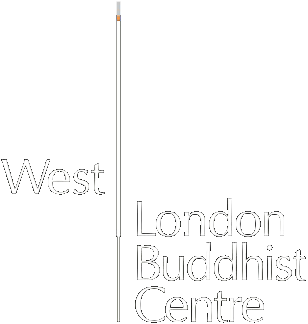The Triratna Community
The Triratna Buddhist Order (formerly WBO) was founded by Urgyen Sangharakshita in 1968, and the Triratna Buddhist Community in 1967. Our principles and practices are drawn from all the various ancient Buddhist traditions, but our overall aim as an Order is to develop ways of practising the teachings of the Buddha that will be effective under the particular conditions of modern life.
In particular, we recognise that the ‘one size fits all’ approach of monastic forms of Buddhism, which prescribe an idealised lifestyle based on the specific social conditions of their country of origin for anyone who wants to be a full-time Buddhist, means that most westerners are left with a merely part-time practice. In Triratna, ‘commitment is primary, lifestyle is secondary’. Whether an Order member is living in a hut as a hermit, or as a celibate member of a retreat community, or as a householder, with a job and family, they are regarded as practising as a full time Buddhist. Some of us, ordained or not, choose to work in Triratna businesses, in which we are able to support each other’s practice whilst earning a living. Others teach full-time, or administer Buddhist institutions full-time. But many of us take the rich challenges of ‘ordinary’ life as the ground of our practice.
This commitment is expressed in the ancient declaration of faith that goes back to the Buddha’s day:
I go for refuge to the Buddha,
I go for refuge to the Dharma,
I go for refuge to the Sangha
So firstly, whatever else we do, we commit ourselves to the possibility, represented by the Buddha’s example, of experiencing the reality of things for ourselves, of ‘awakening’ to who we really are. We believe that this possibility is open to anyone who chooses to dedicate themselves to realising it. Secondly, we believe that there is available to us an effective way of realising it, represented by the Dharma, the teaching of the Buddha. And thirdly, we commit ourselves to the community of the Buddha’s disciples, to the network of support and friendship of other Buddhist practitioners.
Triratna’s radical approach pioneered a non-patriarchal as well as non-hierarchical Sangha or Buddhist community. In almost all Buddhist traditions women have had a subservient role, and in many of them they have not even been allowed full ordination. In Triratna, women Order members have from the start had equal status with men.
Triratna has also had a pioneering role in ‘Engaged Buddhism’. We established a charity, The Karuna Trust in the late seventies, to support medical, social and educational projects in India and elsewhere. This outward-looking, other-regarding attitude is central to the way we practise as Buddhists.
Friendship is a central practice of Triratna. Even though many of our class leaders are now hugely experienced as practitioners and as teachers, we teach as friends to people rather than gurus.
Those who consider themselves friends of the Triratna Buddhist Order can signal a provisional commitment to the Order by becoming a ‘mitra’ (the Sanskrit for ‘friend’). After that, they may at some point want to ask to be ordained. It usually then takes a few years before one is considered ready to be ordained. Until 1987 Sangharakshita was the only preceptor — i.e. the person who ordains someone — now he has passed on this function to senior members of the Order.
The Triratna ethos is one of open and friendly communication, experimentation, and informality. We promote free debate and self-expression and the development of the individual to his or her highest potential. We value the arts and the role of the imagination in deepening our vision and practice as Buddhists. Our creative and liberal outlook as an Order is, however, based in a firm grounding in the fundamentals of Buddhist teaching and practice. We insist on intellectual clarity in our study and communication of the Dharma.
The bedrock of our meditation practice is the cultivation of awareness and kindness, through the practices of the mindfulness of breathing and the metta bhavana, the cultivation of universal loving kindness. The unity of the Order is in our common commitment to these basic principles and practices of the Dharma and to friendship with one another, at least to open and friendly communication with one another.
The Triratna Community does not aim to arrive at a definitive pattern for how a modern Buddhist movement should operate. We are only concerned to keep on trying.

